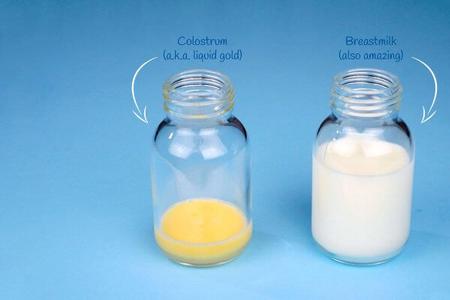What is the Golden Hour in breastfeeding terms?
The first hour after birth is called the golden hour. It is called so because it is very vital in terms of a lot of things. Research has proven that babies are most alert immediately after birth until the first hour is over. From the breastfeeding point of view, it is recommended to start breastfeeding as soon as possible after birth, within the first hour itself. Research has also shown a significant positive correlation between early initiation of breastfeeding and the overall success of breastfeeding.
When a baby is born, she is very alert and active. Like babies of all mammals, human babies are capable of actively seeking their mother’s breasts and start nursing. When a newborn baby is placed on her tummy on the mother’s stomach, she crawls up towards the breasts, finds them and starts nursing. This is called the breast crawl. Almost all babies are capable of doing breast crawl and start nursing on their own within 20 minutes to 1 hour’s time. This is why the first hour after birth is called the golden hour.
When the baby does breast crawl, all of her 5 sensory organs are at work.
- Baby can see the dark nipples and finds the direction to them.
- Baby can hear the mother’s heartbeat while lying on the mother’s body. It is the most familiar sound for the baby that guides her.
- Baby can touch her mother and finds warmth.
- Baby can smell the colostrum which smells very similar to the amniotic fluid. The smell guides them toward the breasts.
- Baby tastes her first food and nourishes herself on her own.
It is recommended that the routine procedures like cleaning/wiping the baby, weighing the baby, Apgar scoring etc are postponed to facilitate breast crawl and to make maximum utilisation of the golden hour.
Skin-to-skin contact can promote strong bonds between mothers and babies and research shows that babies who have had the benefit of skin-to-skin breastfeed better. The American Academy of Paediatrics recommends that all mothers who want to breastfeed spend time skin-to-skin right after birth with their baby.
Quality time is important for mothers and their new-borns, especially during those magical moments after birth. The first hour after birth when a mother has uninterrupted skin-to-skin contact with her new-born is referred to as the “golden hour.” This period of time is an integral factor in a mother’s breastfeeding journey if she chooses to do so.
FAQ 2 : What is Colostrum? why is it less in volume
Colostrum is the first milk mother produces and is the ideal nourishment for a newborn. It’s highly concentrated, full of protein and nutrient-dense – so it’s perfect for your baby’s tiny tummy. It’s also low in fat, easy to digest, and brimming with components that are crucial in building their immune system.
It looks thicker and more yellow than mature milk and its composition is tailored to your newborn’s specific needs. The purpose of colostrum is to provide low-volume milk that helps the newborn as they learn to regulate the suck, swallow, and breathe cycle during feeds. Colostrum has an important role in providing immunity as well as nutrition to the newborn and helps in establishing a healthy gut microbiome which can have long-term, beneficial effects.
- Colostrum is high in carbohydrates, high in protein, high in antibodies, and low in fat (as human newborns may find fat difficult to digest).
- Newborns have very small digestive systems, and colostrum delivers its nutrients in a very concentrated low-volume form.
- It has a mild laxative effect, encouraging the passing of the baby’s first stool, which is called meconium.
- This clears excess bilirubin, a waste product of dead red blood cells which is produced in large quantities at birth due to blood volume reduction, from the infant’s body and helps prevent jaundice.
- Colostrum contains large numbers of antibodies called “secretory immunoglobulin” (IgA) that help protect the mucous membranes in the throat, lungs, and intestines of the infant.
- Leukocytes are also present in large numbers; these begin protecting the infant from harmful viruses and bacteria.
- Ingesting colostrum establishes beneficial bacteria in the digestive tract.
- Premature babies tend to fare better on human colostrum than commercial infant formulas.
- Human milk contains special components, called growth modulators, that help the premature baby’s digestive system adjust to oral feedings.



Wish to speak with a member of our team who is a certified lactation professional and also an experienced breastfeeding mother, click on this link.
Medical Advice Disclaimer
THIS WEBSITE DOES NOT PROVIDE MEDICAL ADVICE.
The information, including but not limited to, text, graphics, images and other material contained on this website are for informational purposes only. No material on this site is intended to be a substitute for professional medical advice, diagnosis or treatment. Always seek the advice of your physician or other qualified health care provider with any questions you may have regarding a medical condition or treatment before undertaking a new health care regimen, and never disregard professional medical advice or delay in seeking it because of something you have read on this website.
Disclaimer
We understand and acknowledge that parents and babies can be of various genders on a spectrum of LGBTQI+. Families come in diverse flavours. However, in our articles, for the sake of simplicity and convenience, we will be referring to the breastfeeding parent as the mother and using the female pronouns- ‘she’ and ‘her’ for babies. Babies can be nourished and nurtured in different ways and while we have used the terms breastfeeding and nursing, we recognize that parents can opt to chest feed or finger feed.
We don’t have conflicts of interest and declare, and we are compliant with the WHO code of marketing of breastmilk substitutes and the IMS act.
In case you find any information on this website that needs to be updated, please write to us at info@bsim.org.in






